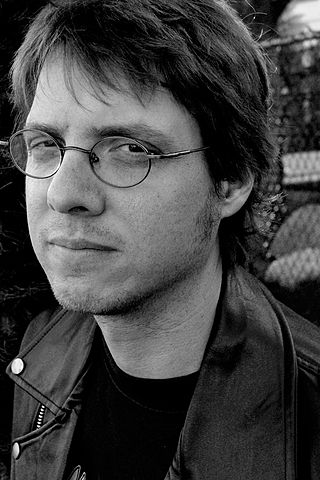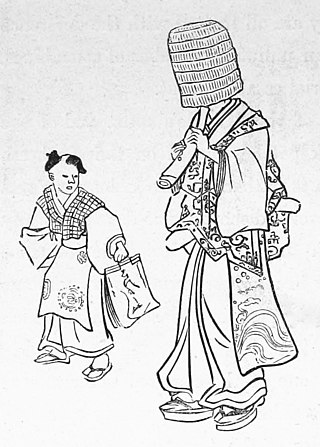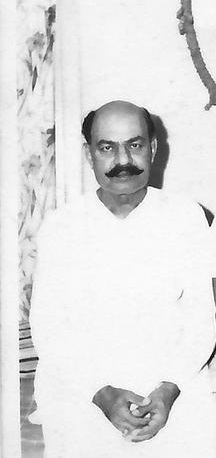Related Research Articles
Musicology is the scholarly study of music. Musicology research combines and intersects with many fields, including psychology, sociology, acoustics, neurology, natural sciences, formal sciences and computer science.

A shakuhachi is a Japanese longitudinal, end-blown flute that is made of bamboo. The bamboo end-blown flute now known as the shakuhachi was developed in Japan in the 16th century and is called the fuke shakuhachi (普化尺八). A bamboo flute known as the kodai shakuhachi or gagaku shakuhachi (雅楽尺八) was derived from the Chinese xiao in the Nara period and died out in the 10th century. After a long blank period, the hitoyogiri shakuhachi (一節切尺八) appeared in the 15th century, and then in the 16th century, the fuke shakuhachi was developed in Japan. The fuke shakuhachi flourished in the 18th century during the Edo period, and eventually the hitoyogiri shakuhachi also died out. The fuke shakuhachi developed in Japan is longer and thicker than the kodai shakuhachi and has one finger hole less. It is longer and thicker than hitoyogiri shakuhachi and is superior in volume, range, scale and tone quality. Today, since the shakuhachi generally refers only to fuke shakuhachi, the theory that the shakuhachi is an instrument unique to Japan is widely accepted.
The music of Uzbekistan has reflected the diverse influences that have shaped the country. It is very similar to the music of the Middle East and is characterized by complicated rhythms and meters. Because of the long history of music in the country and the large variety of music styles and musical instruments, Uzbekistan is often regarded as one of the most musically diverse countries in Central Asia.

Soghomon Soghomonian, ordained and commonly known as Komitas, was an Ottoman-Armenian priest, musicologist, composer, arranger, singer, and choirmaster, who is considered the founder of the Armenian national school of music. He is recognized as one of the pioneers of ethnomusicology.

Brian Ritchie is an American musician, best known as the bassist for the alternative rock band Violent Femmes. Ritchie was born and raised in the United States and is currently a dual citizen of the U.S. and Australia, with his full-time residence in Australia.
Atsuya Okuda is a Japanese-born master player and teacher jinashi shakuhachi, an unrefined bamboo flute. Prior to dedicating his efforts to the bamboo flute, he was a professional jazz trumpet player from approximately 1965 until 1985.

Brad Warner is an American Sōtō Zen teacher, author, blogger, documentarian and punk rock bass guitarist.

Zen Mountain Monastery is a Zen Buddhist monastery and training center on a 220-acre (0.89 km2) forested property in the Catskill Mountains in Mount Tremper, New York. It was founded in 1980 by John Daido Loori originally as the Zen Arts Center. It combines the Rinzai and Sōtō Zen traditions, in both of which Loori received Dharma transmission. Loori's first dharma heir was Bonnie Myotai Treace, Sensei, who received shiho, or dharma transmission, from him in 1996. From Loori's death in October 2009 until January 2015, Zen Mountain Monastery had two teachers: Geoffrey Shugen Arnold and Konrad Ryushin Marchaj, who received Dharma transmission from Loori in 1997 and 2009, respectively. Since January 2015, the training at the Monastery has been led by Shugen Roshi, assisted by Ron Hogen Green, Sensei; Jody Hojin Kimmel, Sensei; and Vanessa Zuisei Goddard, Sensei.

The Komusō (虚無僧) were wandering non-monastic lay Buddhists from the warrior-class who were noted for wearing straw basket hats and playing the shakuhachi bamboo flute, nowadays called suizen. During the Edo period (1600–1868) they obtained various rights and privileges from the bakufu, the ruling elite.
Alcvin Ryuzen Ramos is a shakuhachi teacher, performer, composer, and maker based in Canada. Born in Japan, Ramos has also lived in the United States and now lives in Western Canada. In 2003, he founded the Bamboo-In Shakuhachi Space on the Sunshine Coast.

Sociomusicology, also called music sociology or the sociology of music, refers to both an academic subfield of sociology that is concerned with music, as well as a subfield of musicology that ocuses on social aspects of musical behavior and the role of music in society.
Music Law refers to legal aspects of the music industry, and certain legal aspects in other sectors of the entertainment industry. The music industry includes record labels, music publishers, merchandisers, the live events sector and of course performers and artists.
Riley Kelly Lee is an American-born Australian-based shakuhachi player and teacher. In 1980 he became the first non-Japanese person to attain the rank of Dai Shihan in the shakuhachi tradition. He is a recipient of two of the most revered lineages of shakuhachi playing, descending from the original Zen Buddhist "priests of nothingness" of the Edo period. His first teachers were Hoshida Ichizan II and Chikuho Sakai II. A later teacher was Katsuya Yokoyama.
Christopher Yohmei Blasdel is a shakuhachi performer, researcher and writer specializing in the music of Japan and Asia. In 1972, while on foreign study in Tokyo, he was introduced to the Kinko Style shakuhachi master Goro Yamaguchi, whom he studied with until Yamaguchi’s death in 1999. In 1975, Blasdel began learning Aikido under Yasuo Kobayashi and performing with the butoh dancer Akira Kasai at his studio, Tenshikan. Blasdel presently holds a 5th degree black belt in Aikido.
Computational musicology is an interdisciplinary research area between musicology and computer science. Computational musicology includes any disciplines that use computation in order to study music. It includes sub-disciplines such as mathematical music theory, computer music, systematic musicology, music information retrieval, digital musicology, sound and music computing, and music informatics. As this area of research is defined by the tools that it uses and its subject matter, research in computational musicology intersects with both the humanities and the sciences. The use of computers in order to study and analyze music generally began in the 1960s, although musicians have been using computers to assist them in the composition of music beginning in the 1950s. Today, computational musicology encompasses a wide range of research topics dealing with the multiple ways music can be represented.
Rodrigo Rodríguez is a Spanish shakuhachi player.
David G. Hebert is a musicologist and comparative educationist, employed as Professor of Music at Western Norway University of Applied Sciences, where he leads the Grieg Academy Music Education (GAME) research group. He has contributed to the fields of music education, ethnomusicology, sociomusicology, comparative education, and East Asian Studies. Since 2018, he has been manager of the Nordic Network for Music Education, a multinational state-funded organization that sponsors intensive Master courses and exchange of university music lecturers and students across Northern Europe. He is also a visiting professor in Sweden with the Malmo Academy of Music at Lund University, and an honorary professor with the Education University of Hong Kong. He has previously been sponsored by East Asian governments as a visiting research scholar with Nichibunken in Kyoto, Japan, and the Central Conservatory of Music, in Beijing, China. He also serves in various leadership roles with the International Society for Music Education.

Dabir Khan was a 20th-century 'beenkar' and a vocalist. He was the grandson of legendary vina player Wazir Khan.
George Herzog was an American anthropologist, folklorist, musicologist, and ethnomusicologist.
Heidi Aklaseaq Senungetuk is an Inupiaq scholar of ethnomusicology and a musician. She is the daughter of Ronald Senungetuk and Turid Senungetuk and granddaughter of Helen and Willie Senungetuk, and her family roots originate from Wales (Kiŋigin), Alaska. Senungetuk spent her childhood in Fairbanks, where her father founded the Native Art Center and acted as head of the Department of Art at the University of Alaska.
References
- ↑ "Jon McCollum, Ph.D. Seicho Kenzen". Washington College. Retrieved November 13, 2019.
- ↑ "Nothing Sounds Armenian Like a Duduk". Armenian Weekly. Retrieved November 21, 2019.
- ↑ "Book Reviews: Armenian Music (reviewed by Brian Harlan)". Music Reference Services Quarterly. doi:10.1080/10588160802157314. S2CID 220348788.
{{cite journal}}: Cite journal requires|journal=(help) - ↑ "Choice: Current Reviews for Academic Libraries. Volume 36, p.100". Choice. Retrieved November 21, 2019.
- ↑ According to Music References Review Quarterly, McCollum’s book Music: A Comprehensive Bibliography and Discography is “the most important English-language resource for Armenian music to date,” and a review in Choice describes it as “exceptionally good on history … well organized and indexed”.
- ↑ "Lexington Series". Rowman and Littlefield. Retrieved November 14, 2019.
- ↑ "Historical Ethnomusicology Book Series: Deep Soundings". Sociomusicology blog. 2017-03-29. Retrieved November 14, 2019.
- ↑ McCollum, Jonathan (2018). "Embodying History and Pedagogy: A Personal Journey into the Dokyoku Style of Japanese Shakuhachi". International Perspectives on Translation, Education and Innovation in Japanese and Korean Societies. pp. 255–278. doi:10.1007/978-3-319-68434-5_17. ISBN 978-3-319-68432-1.
- ↑ "Jonathan Kenzen McCollum". International Shakuhachi Society. Retrieved November 13, 2019.
- ↑ "Stealth Wind". Kontakthub. Retrieved November 21, 2019.
- ↑ "about Us". Chester River Sangha: A Zen Buddhist Community. Chester River Sangha. Retrieved November 13, 2019.